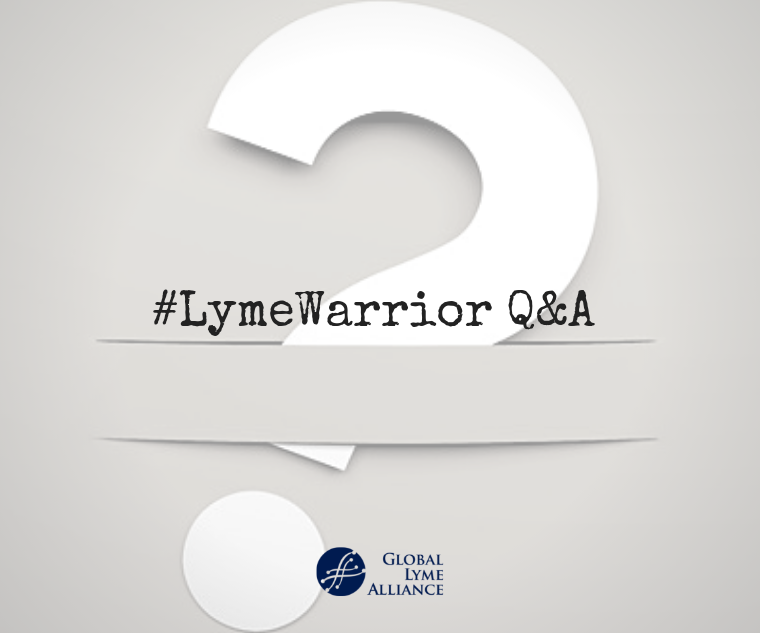
Every few months, Jennifer Crystal devotes a column to answering your questions. Here she answers some questions she recently received. Do you have a question for Jennifer? If so, email her at lymewarriorjennifercrystal@gmail.com.
Did your pain move sometimes? My worst pain is near some scar tissue.
Yes! One of the defining features of Lyme pain is that it’s migratory. This distinguishes it from, say, the pain of Rheumatoid Arthritis (RA), which is more symmetrical (both knees instead of just one), and which doesn’t tend to move around like Lyme pain. While RA affects most of the joints, Lyme can affect one, two, or many.
I felt pain mostly in my forearms and shins, but also sometimes in my back, neck, and head. Sometimes my fingers ached so much I couldn’t type, and other days they felt okay. Now that I’m in remission, I know when I’m having a Lyme flare-up because my forearms and shins start to ache. When I’m overtired or I’ve over-exerted myself, I always get a headache on the left side of my head. (This is due to babesia, which eats oxygen in the red blood cells. When I over-exert myself, I don’t get enough oxygen to that side of my brain, causing inflammation and subsequent pain).
Moreover, Lyme loves to hide in scar tissue, so it makes perfect sense that’s where you’re having the worst pain. I had the anterior cruciate ligament of my left knee repaired before I was aware I had Lyme, and it took much longer for that knee to heal than it should have; this is likely because there was Lyme bacteria in the scar tissue. I’ve also had multiple eye surgeries, and my doctor suspects scar tissue over my left eye is why my headaches often start there.
Is the word “cured” ever used with tick-borne illness?
Yes and no. It depends which illness you have, how long you’ve had it, how quickly you got treatment, and how well you’ve responded to treatment. If Lyme is caught early and treated adequately with two to four weeks of antibiotics—and if it is not complicated by co-infections—it can conceivably be cured. However, even in those cases, some 20% of patients still experience ongoing symptoms called Post Treatment Lyme Disease Syndrome (PTLDS), and they can require additional treatment.
My own Lyme is in remission, not cured because I went eight years undiagnosed. By then the bacteria had crossed the blood-brain barrier. Once it’s in the central nervous system, it becomes very difficult to fully eradicate it. I’m probably 80% restored to full health, a percentage that has continually improved (with brief periods of flare-up).
There are others who have had PTLDS who claim to have been cured, but some of these have subsequently relapsed. It really depends on each individual case.
I was originally diagnosed with the co-infection Ehrlichia, and that is now considered to be cured. I no longer test positive for it or show specific symptoms. The co-infection that still gives me the most trouble is babesia. I was not surprised to hear doctors at this year’s ILADS conference say that babesia can be treated to an extent—symptoms can be alleviated and held at bay for a while—but that it often rebounds. Currently, babesia has no cure.
But don’t despair. Researchers are getting closer to using that coveted word “cure” every day. See my “Highlights From ILADS 2019” post that provides information on new drugs like Dapsone and Disulfiram, the latter of which has some patients, as Dr. Kenneth Liegner stated, “enjoying enduring remission,” that is, feeling well for six months or longer. It’s too early to use the word “cure” decisively.
Do you think I’m going down the right path, being treated for tick-borne disease?
I know it can be confusing when so many doctors give you different diagnoses and treatment options. You don’t know who or what to believe, and that is scary. Even two different LLMDs might give you two different protocols (and that’s because they each have a personal opinion on what might work best for you, since there is no single set protocol for treating tick-borne disease).
If you trust the LLMD who has made a clinical diagnosis of Lyme with or without co-infections, and your symptoms corroborate those infections, and/or your blood work confirms those infections, then yes, I absolutely think you are going down the right path. Remember that having Lyme is not a choice.
Once you begin treatment, you’ll know for sure if you’re on the right path. If you do have Lyme, you’ll likely have a Herxheimer reaction (when the antibiotics kill off the Lyme bacteria at a rate faster than your body can eliminate them, making you feel worse before you feel better). That could be a good indication that you should stay the course.
The real question is, do you feel like you are going down the right path? No one knows your body better than you do. You know you are sick. You know what your symptoms are. You know they are not all in your head. If you’ve seen an LLMD and feel in your gut that the doctor is right for you, then trust that feeling, and don’t worry what anyone else says.

Opinions expressed by contributors are their own.
Jennifer Crystal is a writer and educator in Boston. Her memoir One Tick Stopped the Clock is forthcoming. Contact her at lymewarriorjennifercrystal@gmail.com.

Jennifer Crystal
Writer
Opinions expressed by contributors are their own. Jennifer Crystal is a writer and educator in Boston. Her work has appeared in local and national publications including Harvard Health Publishing and The Boston Globe. As a GLA columnist for over a decade, her work on GLA.org has received mention in publications such as The New Yorker, weatherchannel.com, CQ Researcher, and ProHealth.com. Jennifer is a patient advocate who has dealt with chronic illness, including Lyme and other tick-borne infections. Her memoir, One Tick Stopped the Clock, was published by Legacy Book Press in 2024. Ten percent of proceeds from the book will go to Global Lyme Alliance. Contact her via email below.




-2.jpg)

